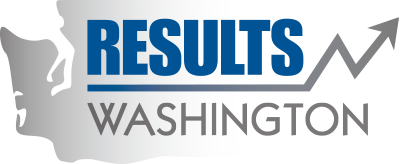Archived: Adults receiving outpatient mental health services
Many individuals in need of mental health treatment have been unable to access ongoing care and have relied on the crisis system for care because of their lack of insurance coverage. Expanding Medicaid coverage should increase access to outpatient mental health services for these individuals, reduce reliance on crisis services, and increase the opportunity for people with mental illness to recover and improve their quality of life. We also expect reductions in the use of costly crisis and long-term inpatient services.
 The counts of persons ages 18 and older served in outpatient mental health (MH) services have been steadily increasing since State Fiscal Quarter (SFQ) 2014/2 (October-December 2014). In SFQ 2016/1 (October - December 2015), a total of 71,499 adults were served in outpatient MH services, above the target of 67,047, and a negligible decline from the 75,104 adults served in SFQ 2015/4 . It is thought that the increase in outpatient clients is attributed in part to the influx of newly eligible Medicaid clients , who began entering the system under Medicaid Expansion starting in January 2014. By implementing the countermeasures outlined by the A3 problem solving workgroup, the Behavioral Health Administration (BHA) continues to exceed the target for this strategic objective.
The counts of persons ages 18 and older served in outpatient mental health (MH) services have been steadily increasing since State Fiscal Quarter (SFQ) 2014/2 (October-December 2014). In SFQ 2016/1 (October - December 2015), a total of 71,499 adults were served in outpatient MH services, above the target of 67,047, and a negligible decline from the 75,104 adults served in SFQ 2015/4 . It is thought that the increase in outpatient clients is attributed in part to the influx of newly eligible Medicaid clients , who began entering the system under Medicaid Expansion starting in January 2014. By implementing the countermeasures outlined by the A3 problem solving workgroup, the Behavioral Health Administration (BHA) continues to exceed the target for this strategic objective.
target for this strategic objective.
What are we working on?
BHA will collaborate with other DSHS administrations, the Health Care Authority and the Washington Health Benefits Exchange on a comprehensive information campaign to enroll persons previously Medicaid-ineligible, to increase access to MH services.
The Administration will implement recommendations of two workgroups convened to discuss issues and develop solutions related to increasing enrollment and improving the process of engaging people into services after intake.
BHA will continue to monitor enrollment and service levels for adults to ensure that the enrollment levels for adults in mental health remain above previously targeted levels and to detect any trend changes; however, the Administration shall replace this measure with the mental health penetration measure as specified in House Bill 1519 and Senate Bill 5732. Adoption of this measure in the BHA Strategic Plan will better align the Administrations Performance Measures with the requirements of HB1519/SB5732 and Senate Bill 6312, and the integration of behavioral health services under Behavioral Health Organizations. The baseline data and specific targets for this new measure are under current review.
The following websites containing information about mental health services and resources:
Mental Health.gov – a site that provides one-stop access to government mental health help and information: MentalHealth.gov
The Division of Behavioral Health and Recovery website, which contains resource information on available behavioral health services: Division of Behavioral Health and Recovery
The Washington State Behavioral Health Advisory Council (BHAC) has a membership consisting of consumers, providers, advocates, and governmental representatives. The membership represents a balanced representation of the state’s population with respect to race, ethnicity, disability, and age, urban and rural. The Council partners with the Division of Behavioral Health and Recovery to make decisions that will best serve citizens in need of mental health and substance abuse treatment and prevention programs: Behavioral Health Advisory Council
